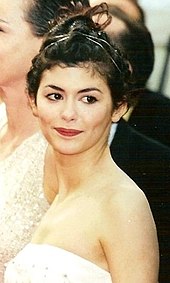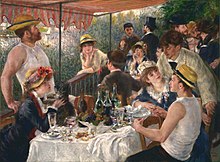Amélie
Amélie (Le fabuleux destin d'Amélie Poulain in French, literally: «The fabulous destiny of Amélie Poulain ») is a 2001 French romantic comedy directed by Jean-Pierre Jeunet. The script was written by Jeunet with the collaboration of the novelist Guillaume Laurant in the dialogues, it was carried out by Audrey Tautou as Amélie. Under the slogan Elle va changer ta vie... (in Spanish: She is going to change your life...), the film was distributed in the United States by Miramax and in Spain by Manga Films.
The film tells the story of the young waitress Amélie Poulain, who the same day she finds out that Lady Di died in a traffic accident, discovers that in her bathroom there is a small box containing toys, photographs and trading cards that a boy hid forty years ago. She then decides to look for him and give him the box. Once she returns the box and notices the positive reaction of its owner, Amélie has a new purpose for her life: to make the people around her happy.
It received great acclaim from both critics and audiences. With more than 23 million viewers internationally, it is the second most successful French-language film at the box office, behind Intouchables.
Amélie won "Best Film" and "Best Director" at both the European Film Awards and the César Awards, as well as other awards and nominations, including 5 nominations for the Academy Awards. A musical adaptation called Amélie, A New Musical was released in 2015.
Plot
It begins with a voiceover that narrates the birth of Amélie, during which she grew up isolated from the rest of the people by her father's decision, due to his mistaken belief that she suffered from heart problems (wrong then, every time she he gave her a medical check-up at home, Amélie's heart would skyrocket simply from physical contact with her father, since he was never normally affectionate with her). This fact, together with the tense atmosphere that prevailed at home, also due to the unstable and nervous nature of his mother, and above all due to her tragic death when a suicidal tourist fell on top of her and jumped into the void from the top of the Notre Dame Cathedral, which sharpened her father's antisocial tendencies, causes the girl to develop an unusually active imagination. As quoted in the film, “the days go by, the months and then the years. Around her everything seems so dead that Amélie prefers to dream until she reaches the age to leave home ». Amélie turns 23 and leaves her house to settle in an apartment in Montmartre that she pays for by working as a waitress at the Café des 2 Moulins (Café de Los Dos Molinos). There a series of characters are revealed:
- Suzanne, the owner, former artist of the artistic horse, who takes a little (since her own horse fell on top) but never spills anything, who likes to see athletes who cry for disillusionment and does not like a man to be humiliated in the presence of his son.
- Georgettethe seller of hypochondriac tobacco, who hates the phrase "the fruit of her womb".
- Gina, waitress, like Amélie, whose grandmother was healing, and who likes to crunch the bones.
- Hippolyte, a failed writer, who likes to watch bullfighters on television.
- JosephThe rejected lover of Gina, who passes by spying all day and who just likes to blow up the bubble paper.
- Philomène, flight hostess, who likes the noise produced by the cat bowl in the tile, which he likes to hear stories.
Amélie doesn't have a boyfriend, she tried once or twice, but was disappointed with the results. Instead, Amélie has cultivated a taste for small pleasures, such as: reaching into a sack full of beans, breaking the caramelized sugar cap of the Crème brûlée with a spoon, seeing her face in the dark at the cinema. at people, throwing rocks into the Saint Martin Canal, or trying to guess how many people do something at a certain time (such as how many couples orgasm at a specific time, to which you reply: "fifteen").
But on August 30, 1997, the event that will change Amélie's life occurs. After a series of circumstances due to the shock caused by finding out about Lady Di's accident on television, she discovers behind a tile in her bathroom the little treasure kept by a boy forty years ago. Fascinated by her discovery, on August 31 at 4:00 in the morning, she has a spectacular idea: wherever she is, Amélie will find the owner and return her treasure to him. If she moves him, she will become an avenger of good. If not, then nothing.
With the help of his neighbor Raymond (known as "The Glass Man" due to his weak bones, who has not left his home for 20 years and who only sees the world through the reproduction of a painting by Pierre -Auguste Renoir), and after a long search throughout the city, Amélie finally manages to locate the owner of the treasure and return it to him by chance after a very original strategy. The owner is not only deeply moved to discover that his whole life was in that box, but also considers improving his current life.
At that moment, Amélie has a feeling of complete harmony and decides to turn to others to create happiness in their lives. In this way, she invents all kinds of most original and moving strategies to intervene, without their realizing it, in the existence of various people around her.
- Like when he grabs a blind wanderer's arm and gives him a quick but intense walk through a market while whispering in his ear all she's seeing, producing in the blind a state of immeasurable emotion.
- It also makes Georgette forget his hypochondriac character and Joseph his disdained obsession with Gina, by provoking Amélie a situation of romance of the most passionate between them.
- In the same way, you get rid of the cruel wart in your neighborhood, who constantly humiliates his young assistant, making him ridiculous in front of everyone.
- He also gets his neighbor Raymond out of the obsession with Renoir's painting by sending anonymous videos, where beautiful scenes of the most curious are shown, which produce in the old man an immediate need to expand his mind beyond what he had done before.
- Also thanks to Amélie, Hipólito reclaims illusion for his literature by discovering one of his verses painted on a street wall: «Sans toi, les émotions d’aujourd’hui ne seraient que la peau morte des émotions d’autrefois» (Without you, today's emotions would be nothing more than yesterday's dead skin.).
- And especially when, using a gnome of stone, garden, to whom his father had special affection, he finally decided to pack his bags and take a trip around the world.
But while all this is happening and no one cares about Amélie, she is involuntarily forced to examine and appreciate her lonely life. This feeling is especially sharpened after meeting Nino, a boy as strange and dreamy as she is, who works half a day in "El Tren del Horror" and the other half in a sex shop, who collects the photos that people discard in the shops. photo booths. Amélie is fascinated by Nino, but she prefers a chance meeting to a direct introduction. She tries several times without success and ends up giving it up as impossible. But, finally, Raymond returns the same coin to Amélie, prompting her to look for what he had left in the background: her own happiness. Thus, Amélie ends up happily in Nino's arms, whom she kisses in the most subtle and complacent way that she can imagine.
Cast
- Audrey Tautou as Amélie Poulain
- Flora Guiet like little Amélie
- Mathieu Kassovitz as Nino Quincampoix
- Amaury Babault as little Nino
- Rufus like Raphaël Poulain
- Serge Merlin as Raymond Dufayel, "The Glass Man"
- Lorella Cravotta as Amandine Poulain
- Clotilde Mollet as Gina
- Claire Maurier as Suzanne
- Isabelle Nanty like Georgette
- Dominique Pinon as Joseph
- Penguern Artus as Hippolyte
- Yolande Moreau as Madeleine Wallace
- Urbain Cancelier as Collignon
- Jamel Debbouze as Lucien
- Maurice Bénichou as Dominique Bretodeau
- Kevin Fernandes as little Dominique
- Michel Robin as Mr. Collignon
- Andrée Damant as Mrs. Collignon
- Claude Perron as Eve
- Armelle like Philomène
- Ticky Holgado like the man in the picture
- Franck-Olivier Bonnet, Alain Floret, Jean-Pol Brissart, and Frédéric Mitterrand as additional voices
Release dates
Commercial success
As of September 3, 2012, Amélie is the second highest grossing French film of all time with 32,405,858 admissions, only after Intouchables with 23 352,264 tickets (film that is still in operation). It is also the fourth highest-grossing foreign-language film of all time, after Intouchables, The Fifth Element and Taken. In total, Amélie reports box office earnings of $173,921,954.
One of the highest-grossing French films of all time (more than 30 million viewers worldwide), Amélie marked a very unusual phenomenon for its date: displacing the always-grossing American films in France and achieving a great impact outside your country, in markets such as the US, Europe, Latin America and Asia.
The film Amélie was shot almost entirely in the Parisian neighborhood of Montmartre. That led to the emergence in later years of a trend among tourists to take the so-called 'The Fabulous Tour of Amélie Poulain' or also 'The Paris of Amélie Poulain' that covers the most popular locations in this neighborhood where the film was shot.
'Les deux moulins' (The Two Mills). It is the cafeteria where Amélie works and where most of the important characters in the film meet and meet. The director himself, Jean-Pierre Jeunet, is a regular customer of this bar in real life, since his house is right in front of it, perhaps for this reason he chose this cafeteria as the key setting for the film. Before shooting Amélie, the owner of the place thought of closing the business because it did not work very well, but after the film, this has become one of the most touristic spots in the neighborhood.
The Lamarck-Caulaincourt metro entrance. In the film there is a scene in which Amélie takes a blind man by her arm and gives him a tour of the neighborhood's shopping area, giving a detailed description of each scene so that he could experience it. The route ends at the Lamarck-Caulaincourt metro station.
Metro Abbesses. It is not known with certainty where Amélie's house is, but it is known that it is in the Abbesses area, in Montmartre. In fact, the film was originally going to be called Amélie des Abbesses but that title was scrapped because this neighborhood is not known outside of Paris. This metro stop is the one that the protagonist uses the most because it is the closest to her house. The first meeting between Amélie Poulain and Nino Quincampoix took place at this metro stop, although in reality it was the Porte des Lilas stop decorated as if it were Abbesses.
Sacré-Cœur (Basilica of the Sacred Heart) . One of the most popular parts of the movie is when Amélie plays a game to return her photo album to Nino. This game begins at the carousel at the fair in Place de La Villette and continues through the gardens that go up to the basilica, ending at one of the viewpoints of the Sacré-Cœur.
The Greengrocer 'Épicerie Collignon' . This setting appears many times in the film and is quite important, in fact at the beginning of the film, this greengrocer is part of Amélie's presentation. The owner of the place knew how to take advantage of the fame that the business acquired from the film and recorded several musical albums. The covers of his albums are exposed in the same greengrocer.
Awards
Oscar
| Year | Category | Person/State | Outcome |
|---|---|---|---|
| 2001 | Best foreign film | France | Candidate |
| 2001 | Best original script | Guillaume Laurant Jean-Pierre Jeunet | Candidates |
| 2001 | Better photograph | Bruno Delbonnel | Candidate |
| 2001 | Best artistic direction | Aline Bonetto Marie-Laure Valla | Candidates |
| 2001 | Better sound | Vincent Arnardi Guillaume Leriche Jean Umansky | Candidates |
BAFTA Awards
| Year | Category | Person | Outcome |
|---|---|---|---|
| 2001 | Best movie | Claudie Ossard | Candidate |
| 2001 | Best foreign film | Claudie Ossard Jean-Pierre Jeunet | Candidate |
| 2001 | Better direction | Jean-Pierre Jeunet | Candidate |
| 2001 | Best actress | Audrey Tautou | Candidate |
| 2001 | Best original script | Guillaume Laurant Jean-Pierre Jeunet | Winners |
| 2001 | Best music | Yann Tiersen | Candidate |
| 2001 | Better photograph | Bruno Delbonnel | Candidate |
| 2001 | Better assembly | Hervé Schneid | Candidate |
| 2001 | Best production design | Aline Bonetto | Winner |
Cesar Awards
| Year | Category | Person | Outcome |
|---|---|---|---|
| 2001 | Best movie | Jean-Pierre Jeunet | Winner |
| 2001 | Better direction | Jean-Pierre Jeunet | Winner |
| 2001 | Best actress | Audrey Tautou | Candidate |
| 2001 | Best secondary actor | Rufus | Candidate |
| 2001 | Best secondary actor | Jamel Debbouze | Candidate |
| 2001 | Best secondary actress | Isabelle Nanty | Candidate |
| 2001 | Best original script | Guillaume Laurant Jean-Pierre Jeunet | Candidates |
| 2001 | Best music | Yann Tiersen | Winner |
| 2001 | Better photograph | Bruno Delbonnel | Candidate |
| 2001 | Better assembly | Hervé Schneid | Candidate |
| 2001 | Best artistic direction | Aline Bonetto | Winner |
| 2001 | Best costumes | Madeline Fontaine | Candidate |
| 2001 | Better sound | Vincent Arnardi Guillaume Leriche Jean Umansky | Candidates |
Karlovy Vary International Film Festival
| Year | Category | Nomine/a | Outcome |
|---|---|---|---|
| 2001 | Awards since the velvet Revolution | Amélie | Winner |
Toronto International Film Festival
| Year | Category | Nomine/a | Outcome |
|---|---|---|---|
| 2001 | Public Award | Amélie | Winner |
Sant Jordi Film Awards
| Year | Category | Nomine/a | Outcome |
|---|---|---|---|
| 2001 | Best foreign actress | Audrey Tautou | Winner |
Critics' Choice Movie Award
| Year | Category | Nomine/a | Outcome |
|---|---|---|---|
| 2001 | Best foreign film | Amélie | Winner |
Prix Lumiere
| Year | Category | Nomine/a | Outcome |
|---|---|---|---|
| 2001 | Best movie | Amélie | Winner |
| 2001 | Better Guion | Guillaume Laurant Jean-Pierre Jeunet | Winners |
| 2001 | Best Actress | Audrey Tautou | Winner |
Soundtrack
Amelie. A movie by Jean-Pierre Jeunet. Music by Yann Tiersen (film soundtrack). CD edited by Victoire Productions-Labels/Virgin France, 2001.
- "J'y suis jamais there"
- "Les jours sad" (Instrumental) - 3:03
- "La valse d'Amélie" (Original version) - 2:15
- "Comptine d'un autre été: l'après-midi" -
- "La noyée" - 2:03
- "L'autre valse d'Amélie" - 1:33
- "Guilty" (Al Bowlly) - 3:13
- "A quai" - 3:32
- "Le moulin" - 4:27
- "Step if simple" - 1:52
- "La valse d'Amélie" (Orchestral Vision) - 2:00
- "La valse des vieux os" - 2:20
- "The dispute" - 4:15
- "If your natais pas là" (Fréhel) - 3:29If you don't have to. - Fréhel.
- "Soir de fête" - 2:55
- "The Redeemer" - 1:13
- "Sur le fil" - 4:23
- "Le banquet" - 1:31
- "La valse d'Amélie" (Piano version) - 2:38
- "The Wall of Monsters" - 3:39
- "La donna e mobile" - 2:45
In 2003 the French singer Alizée recorded the song Amélie m'a dit, in which she pays homage to the film. The song is included on the album Mes courants électriques and was a single from her live album En concert . There is also an English version of the song.
Video excerpts and artistic quotes used in the film
- In a scene where television is shown, appears Sister Rosetta Tharpe, a famous guitarist and singer in the 1930s and 1940s with her unique blend of spiritual letters and accompaniment rock and roll.
- An extract of images sequences from Critérium International, a career of professional cycling in stages that is disputed in France, where you can see to trot a horse.
- The images of the funeral of Amélie Poulain, the benefactor of the poor, are actually images of the burial of Sarah Bernhardt, which we recognize the grave at Pere Lachaise.
- Three clips appear from the 1962 Jules and Jim film, directed by François Truffaut.
- A special flash extract presented by Benoît Duquesne in France 2, French public television channel, where the death of Princess Diana is announced.
- A painting by French Impressionist painter Pierre-Auguste Renoir, The Lunch of Remeros (1881), in French: Le déjeuner des canotiers).
- Several paintings by the surreal German painter Michael Sowa (born in 1945): Isabean neck, Bird with pearls, Bear and Herbert.
- The song Le Poinçonneur des Lilas interpreted and written by Serge Gainsbourg, recorded in June 1958, is used as the main means for a scene where an adult marriage discusses as the husband is responsible for piercing the laurels of the house.
Musical
In 2017, a musical of the same name was created on Broadway with music by Daniel Messé. It lasted a few months and did not achieve the desired success. It starred Tony Award nominee Phillipa Soo.
Contenido relacionado
Glen o Glenda
Jose conrado
Premio Sidewise





